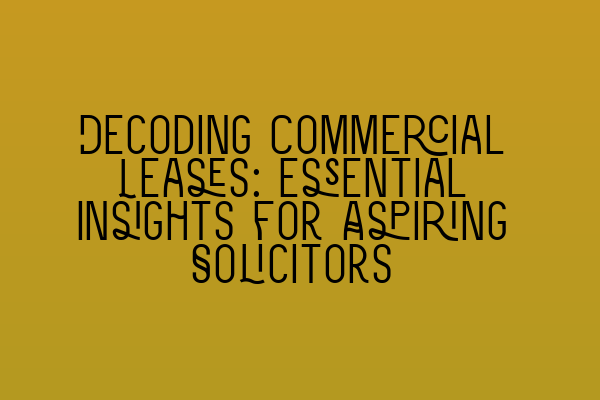Decoding Commercial Leases: Essential Insights for Aspiring Solicitors
Commercial leases form a crucial aspect of property law, and understanding their intricacies is essential for any aspiring solicitor in the field. These leases govern the relationship between landlords and tenants for commercial properties, outlining the rights and obligations of both parties.
In this comprehensive guide, we will walk you through the key aspects of commercial leases, providing you with essential insights that will help you navigate this complex legal terrain. Whether you are preparing for the Solicitors Qualifying Examination (SQE) or simply looking to expand your knowledge in property law, this article is designed to equip you with the tools you need to succeed.
The Importance of Commercial Leases in Property Law
Commercial leases are vital documents that lay out the terms and conditions of a tenancy agreement for commercial properties. Understanding these leases is crucial for solicitors who specialize in commercial property law, as they form the framework within which landlords and tenants operate.
From rental payments and lease duration to property maintenance and tenant responsibilities, commercial leases cover a broad range of legal aspects. As a solicitor, it is your duty to ensure that these agreements are fair, transparent, and legally binding for all parties involved.
Key Elements of a Commercial Lease
To fully grasp the intricacies of commercial leases, it is important to break them down into their key elements. By understanding the following components, you will be better equipped to handle commercial lease negotiations and provide informed advice to your clients:
1. Rent and Escalation Clauses
The rent is the cornerstone of any commercial lease. It is essential to carefully review the terms involving rental payments, including the frequency, amount, and any escalation clauses. These clauses outline how the rent may increase over time, taking into account inflation or other factors that may impact the property’s value.
Understanding the rent structure and escalation clauses is crucial for both landlords and tenants, as it directly affects both parties’ financial interests.
2. Lease Duration and Renewal Options
The lease duration specifies the length of the tenancy agreement. It is important to carefully review this aspect, including any options for renewal or termination. As a solicitor, you must advise your client on the optimal lease duration based on their business needs and goals.
Additionally, understanding the renewal options and procedures is crucial, as they can significantly impact the tenant’s operations and the landlord’s long-term income stream.
3. Repair and Maintenance Obligations
Commercial leases outline the responsibilities for property maintenance and repairs. These obligations can be divided between the landlord and tenant, depending on the lease agreement. It is essential to review these clauses thoroughly to ensure that both parties have a clear understanding of their duties.
By understanding the repair and maintenance obligations, you can help your clients avoid potential disputes and protect their interests.
4. Use and Alteration of the Property
Commercial leases often restrict the use and alteration of the property to protect the interests of both the landlord and neighboring tenants. Understanding these restrictions is vital, as they can impact the client’s ability to operate their business effectively.
As a solicitor, it is your responsibility to ensure that your client’s objectives align with the lease’s limitations on property use and alteration.
5. Break Clauses and Termination
Break clauses allow either party to terminate the lease prematurely. Understanding the conditions and procedures for invoking break clauses is essential, as they can have significant implications for both landlords and tenants.
By carefully reviewing break clauses and termination provisions, you can help your clients navigate potential lease terminations and protect their interests.
Conclusion
Commercial leases are complex documents that require a thorough understanding of property law. As an aspiring solicitor in property law, decoding commercial leases is essential for your success in representing landlords and tenants.
By familiarizing yourself with the key elements of commercial leases, such as rent and escalation clauses, lease duration and renewal options, repair and maintenance obligations, use and alteration restrictions, and break clauses and termination provisions, you will be well-prepared to provide valuable advice and guidance to your clients.
Remember, becoming an expert in commercial leases is a continuous process. Stay up-to-date with the latest developments in property law, maintain a deep understanding of precedents and case law, and continuously sharpen your negotiation skills.
If you are preparing for the SQE, make sure to check out our related articles:
